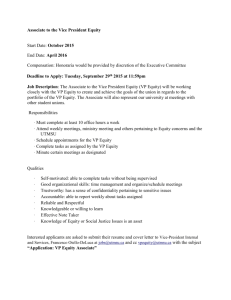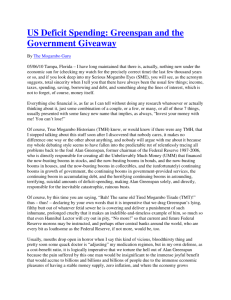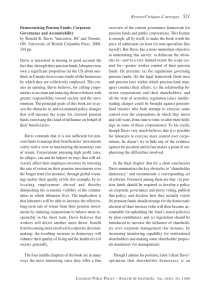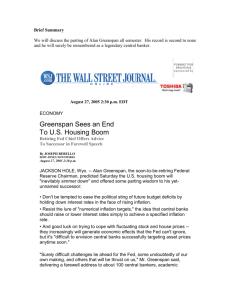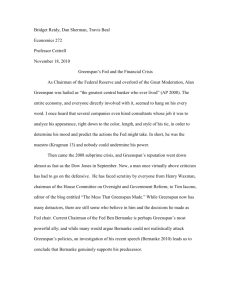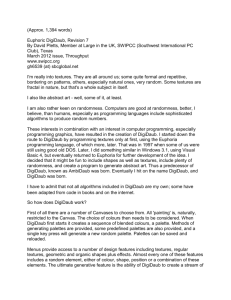In academic prose, we seek clarity
advertisement
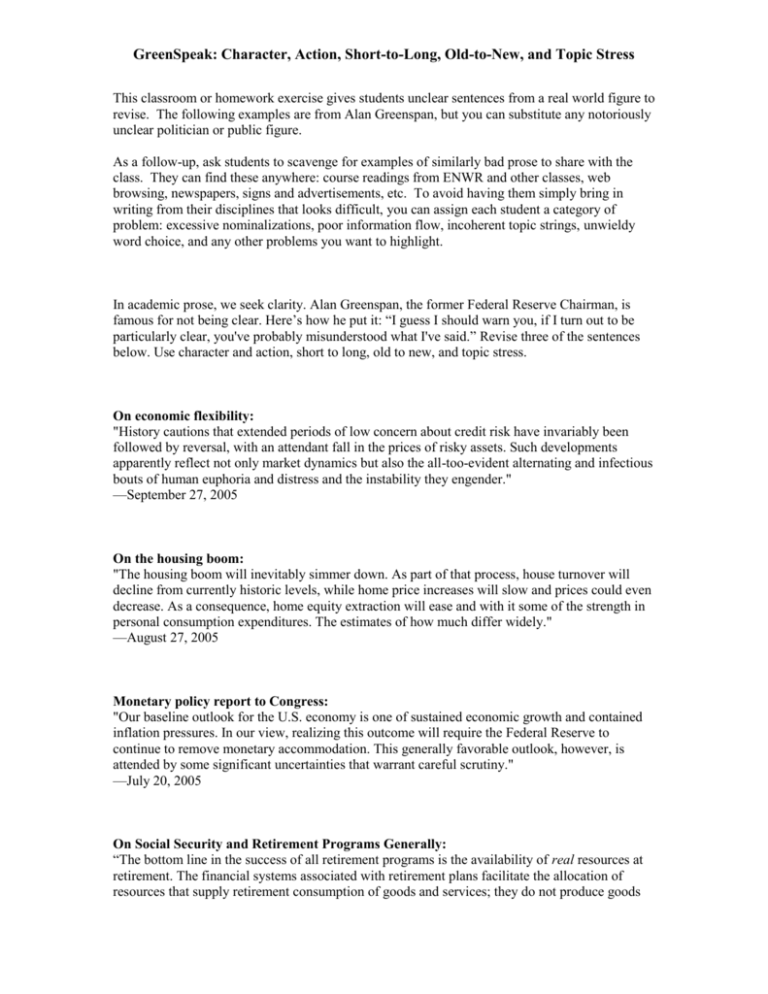
GreenSpeak: Character, Action, Short-to-Long, Old-to-New, and Topic Stress This classroom or homework exercise gives students unclear sentences from a real world figure to revise. The following examples are from Alan Greenspan, but you can substitute any notoriously unclear politician or public figure. As a follow-up, ask students to scavenge for examples of similarly bad prose to share with the class. They can find these anywhere: course readings from ENWR and other classes, web browsing, newspapers, signs and advertisements, etc. To avoid having them simply bring in writing from their disciplines that looks difficult, you can assign each student a category of problem: excessive nominalizations, poor information flow, incoherent topic strings, unwieldy word choice, and any other problems you want to highlight. In academic prose, we seek clarity. Alan Greenspan, the former Federal Reserve Chairman, is famous for not being clear. Here’s how he put it: “I guess I should warn you, if I turn out to be particularly clear, you've probably misunderstood what I've said.” Revise three of the sentences below. Use character and action, short to long, old to new, and topic stress. On economic flexibility: "History cautions that extended periods of low concern about credit risk have invariably been followed by reversal, with an attendant fall in the prices of risky assets. Such developments apparently reflect not only market dynamics but also the all-too-evident alternating and infectious bouts of human euphoria and distress and the instability they engender." —September 27, 2005 On the housing boom: "The housing boom will inevitably simmer down. As part of that process, house turnover will decline from currently historic levels, while home price increases will slow and prices could even decrease. As a consequence, home equity extraction will ease and with it some of the strength in personal consumption expenditures. The estimates of how much differ widely." —August 27, 2005 Monetary policy report to Congress: "Our baseline outlook for the U.S. economy is one of sustained economic growth and contained inflation pressures. In our view, realizing this outcome will require the Federal Reserve to continue to remove monetary accommodation. This generally favorable outlook, however, is attended by some significant uncertainties that warrant careful scrutiny." —July 20, 2005 On Social Security and Retirement Programs Generally: “The bottom line in the success of all retirement programs is the availability of real resources at retirement. The financial systems associated with retirement plans facilitate the allocation of resources that supply retirement consumption of goods and services; they do not produce goods GreenSpeak: Character, Action, Short-to-Long, Old-to-New, and Topic Stress and services. A useful test of a retirement system for a society is whether it sets up realistic expectations as to the future availability of real resources and, hence, the capacity to deliver postwork consumption without overly burdening the standard of living of the working-age population.” —March 15, 2005 Quotes from Greenspan are from one of these sites: http://www.federalreserve.gov/boarddocs/testimony/2005/20050315/ http://www.dallasfed.org/news/speeches/greenspeak.html GreenSpeak: Character, Action, Short-to-Long, Old-to-New, and Topic Stress This is an advanced exercise on style. The challenge is to uncover what Alan Greenspan meant when he said what he said. It is recommended for group work of about 20 or 30 minutes. Explain to students that Alan Greenspan's words, as chairman of the Federal Reserve, have considerable effects. His words, by themselves, can move the stock market. In order to avoid that, he tends always to provide numerous caveats and generalities. The students may need a definition for "home equity extraction." If you have a mortgage, the part of the house you own is your equity. You can borrow against (extract) your equity. If home prices are rising slowly, you must build up equity over many years before you can extract money from your home equity (for example, to pay off credit cards). However, if home prices are rising rapidly, you can re-finance your home and extract "equity" based on the equity you've gained as a result of the price rising. Below is a sample revision of "On economic flexibility." On economic flexibility: The economy responds both to market dynamics and to the human tendency to alternate between infectious bouts of euphoria and of distress. History shows that the crucial market dynamic is the perception of credit risk. If credit risk is perceived to be low for an extended period, a reverse in the perception is inevitable. If the perception reverses, the price of risky assets fall. The price of risky assets is unstable because the market responds to shifts in perceived credit risk. The perception of credit risk is unstable because humans tend to alternate between euphoria and distress.



